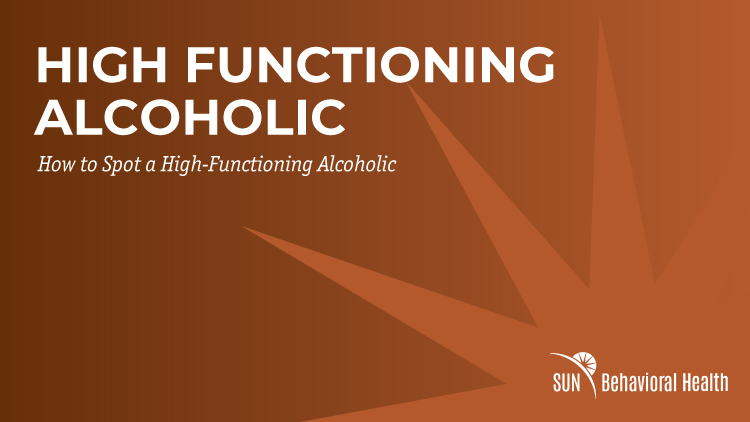Services
- Home
- Mental Health
- Who We Treat
- How We Treat
- Patients & Visitors
- About
- Lexington
close

Before going out on the town in Kentucky, you decide to drink a glass of wine. You know that you need a glass or three to get started, but you don’t want to be drinking too much when you are with your friends. You figured that drinking a glass before will help relax you, and nobody has to know that you have already been drinking tonight. By the night's end, the bartender hands you your tab, and you realize you have had 5 drinks. A part of you hopes that none of your friends notice you have been drinking so much. You are worried they might think you need help when you actually have things under control. You still have friends and a job. If you wanted to stop, you would, even though it would be difficult.
In 2019, 6.9% of people in Kentucky had an alcohol use disorder. One of the reasons why someone who is a high-functioning alcoholic might be resistant to getting treatment is because they are either in denial that they have an alcohol concern or they have questions regarding getting treatment. Many people with high-functioning alcohol use disorder don’t view themselves as severe enough to get treatment. At SUN Behavioral Health Kentucky, we offer a no-cost care assessment that allows you to meet with a representative before starting your treatment here. Today, we are going to discuss how to recognize if you or a loved one is a high-functioning alcoholic.
Being a high-functioning alcoholic is not an official diagnosis. Instead, it might refer to someone in one of the early stages of alcoholism. This idea might relate to people who can carry out their daily tasks while also experiencing consequences from their alcohol use. These daily tasks might include personal hygiene, paying bills, managing a career, and caring for children. They might also lack other impairments typically found in alcohol use disorders. They might feel like alcohol controls their life, and they would have a difficult time stopping due to alcohol withdrawals such as cravings. The main difference between someone who is considered a high-functioning alcoholic and someone with an alcohol use disorder is the level of severity. The good news is no matter where you are on the spectrum of an alcohol use disorder, remember recovery and treatment are always achievable, even if it seems impossible.
One of the most common signs for someone who is a high-functioning alcoholic is that despite their challenges with alcohol, they are still able to maintain a stable career. They can have any profession, but most commonly, they can be college educated careers such as pilots, doctors, nurses, and lawyers. They might be miners and construction workers. Food service workers are also likely to have high-functioning alcoholism. These include bartenders, chefs, restaurant managers, and servers, as alcohol is readily available. Someone with a high-functioning alcohol use disorder might have a high-stress career. They often use their career as an excuse to drink away the stress.

There are several ways to know if alcohol has control over your life, even if you can function every day. One of those ways is if you realize after a night on the town that you drank more than you intended to. Perhaps you told yourself you would only have 1 or 2 drinks on your night out in Kentucky but found out you had 4. If this happens regularly, you might have trouble controlling how much you drink. Alongside that, you might notice that your tolerance for alcohol is higher. You feel like your body needs more alcohol to be able to feel the effects that you had felt once before. When you aren’t drinking, you want to drink more. You might experience alcoholism side effects such as an intense craving for alcohol when you haven’t had any alcohol in a while. These cravings might have played a role if you have ever said to yourself, “I can quit drinking whenever,” but have never been able to follow through on that statement.
It can be easy to want your loved one to get treatment right away or immediately join Alcoholics Anonymous. Still, it might not be that easy to accomplish. Your loved one might resist your advances if you approach them in haste. Instead, come to your loved one with knowledge and honesty in an appropriate moment. Don't approach them when they are not sober, don't blame or shame them, and don't use labels. Note that there will probably still be resistance, especially if they are a high-functioning alcoholic. They might not be willing or aware of their behaviors. Bringing the conversation up multiple times can be helpful. Also, addressing the signs of alcoholism that you see in them can help them see that they need help. Remember that no matter where they are in their journey with alcohol, help is always possible. Alcohol use disorder treatment is beneficial no matter the severity of alcohol use.
People with high-functioning alcoholism can benefit from alcohol detox just the same as someone who has a more severe form of alcohol use disorder. Someone with high-functioning alcoholism has many of the same situations as severe forms of alcohol use disorder. Receiving treatment at a facility can help someone better manage their stress and any other emotions that are associated with their alcohol use, such as guilt, shame, and depression. Even though people who have high-functioning alcoholism can maintain relationships, those relationships can still strain. You might feel like you are hiding things from your loved ones, which can create feelings of mistrust and betrayal. Seeking help is vital at any stage of alcohol use, and it can result in a healthier version of yourself. Treatment can teach you skills and techniques you might not have known to help you manage all aspects of your life.
People who have high-functioning alcoholism might experience several signs. The top 5 signs include:

Remember that getting treatment for any level of alcohol use disorder is possible. You don't have to do it alone. Located in Erlanger, KY, SUN Behavioral Health is dedicated to solving unmet needs in our community. One of these ways is by offering 24/7 crisis care that allows you to get started on your treatment at the moment instead of waiting for a "better" time and risking changing your mind. For more information or to get started on your treatment today, call us at 859-429-5188.